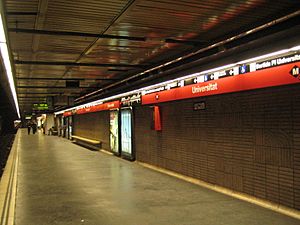
Red line on Universitat station
Line 1 (or L1) is a super important part of the metro system in Barcelona. It's often called the "Red Line" because that's its color on the map! This line runs all the way from "Hospital de Bellvitge" to "Fondo". It's the second oldest metro line in Barcelona, right after L3. The company that runs it is called Transports Metropolitans de Barcelona (TMB).
History of the Red Line
The Red Line has grown a lot over the years, connecting more and more parts of Barcelona and nearby towns.
- 1926: The very first part of the line opened between Bordeta and Catalunya stations.
- 1932: The line got longer, extending from Bordeta to Santa Eulàlia and from Catalunya to Arc de Triomf.
- 1933: More tracks were added, connecting Arc de Triomf to Marina.
- 1951: The line reached Clot from Marina.
- 1952: It continued to expand, connecting Clot to Navas.
- 1954: The line stretched further, from Navas to Fabra i Puig.
- 1968: Fabra i Puig was connected to Torras i Bages.
- 1983: A big year! The line extended from Torras i Bages to Santa Coloma and from Santa Eulàlia to Torrassa. The old Bordeta station closed down.
- 1987: The line grew from Torrassa to Avinguda Carrilet.
- 1992: The newest section opened, connecting Santa Coloma to Fondo.
Cool Facts About L1
Here are some interesting details about the Red Line:
| Color on map |
Red |
| Number of stations |
30 |
| Type of metro |
It's a regular, traditional metro line. |
| How long is it? |
About 20.7 kilometers (12.9 miles) long. |
| What trains does it use? |
It uses trains from the 4000 series and 6000 series. |
| Where does it go? |
It travels through L'Hospitalet, different parts of Barcelona (like Sants-Montjuïc, Eixample, Sant Martí, Sant Andreu), and Santa Coloma. |
| How long does a full trip take? |
About 35 minutes from one end to the other. |
| What's the track width? |
The tracks are 1668 millimeters wide. This is also known as "Iberian gauge." |
| How do the trains get power? |
They run on electricity. |
| How is power supplied? |
Through a special "rigid overhead wire" system. |
| Are there any outdoor parts? |
Yes, there are sections where the line runs above ground, like between Santa Eulàlia and Mercat Nou stations. |
| Can I use my phone? |
Mobile phone service is available in some parts of the line, but not everywhere. |
| Where are the train garages? |
The trains are kept and maintained at depots in Santa Eulàlia and Sagrera. |
| Who runs the line? |
TMB is the operator. |
Stations on Line 1
Line 1 has many stations, connecting you to different parts of the city and other metro lines. The  means the station is accessible for people with disabilities. Stations or lines shown in italic are still being built or planned.
means the station is accessible for people with disabilities. Stations or lines shown in italic are still being built or planned.
- Hospital de Bellvitge

- Bellvitge

- Av. Carrilet
 (Connects to L8)
(Connects to L8)
- Rambla Just Oliveras
 (Connects to RENFE trains)
(Connects to RENFE trains)
- Can Serra

- Florida

- Torrassa
 (Connects to L9, L10)
(Connects to L9, L10)
- Santa Eulàlia

- Mercat Nou

- Plaça de Sants
 (Connects to L5)
(Connects to L5)
- Hostafrancs

- Espanya
 (Connects to L3, L8)
(Connects to L3, L8)
- Rocafort

- Urgell

- Universitat
 (Connects to L2)
(Connects to L2)
- Catalunya
 (Connects to L3, L6, L7, and RENFE trains)
(Connects to L3, L6, L7, and RENFE trains)
- Urquinaona
 (Connects to L4)
(Connects to L4)
- Arc de Triomf
 (Connects to RENFE trains)
(Connects to RENFE trains)
- Marina
 (Connects to T4 tram)
(Connects to T4 tram)
- Glòries
 (Connects to T4 tram)
(Connects to T4 tram)
- Clot
 (Connects to L2, RENFE trains)
(Connects to L2, RENFE trains)
- Navas

- Sagrera
 (Connects to L5, L9, L10)
(Connects to L5, L9, L10)
- Fabra i Puig
 (Connects to RENFE trains)
(Connects to RENFE trains)
- Sant Andreu
 (Connects to RENFE trains)
(Connects to RENFE trains)
- Torras i Bages

- Trinitat Vella
- Baró de Viver

- Santa Coloma

- Fondo
 (Connects to L9)
(Connects to L9)
See also
 In Spanish: Línea 1 (Metro de Barcelona) para niños
In Spanish: Línea 1 (Metro de Barcelona) para niños
![]() means the station is accessible for people with disabilities. Stations or lines shown in italic are still being built or planned.
means the station is accessible for people with disabilities. Stations or lines shown in italic are still being built or planned.

 (Connects to L8)
(Connects to L8) (Connects to RENFE trains)
(Connects to RENFE trains)

 (Connects to L9, L10)
(Connects to L9, L10)

 (Connects to L5)
(Connects to L5)
 (Connects to L3, L8)
(Connects to L3, L8)

 (Connects to L2)
(Connects to L2) (Connects to L3, L6, L7, and RENFE trains)
(Connects to L3, L6, L7, and RENFE trains) (Connects to L4)
(Connects to L4) (Connects to RENFE trains)
(Connects to RENFE trains) (Connects to T4 tram)
(Connects to T4 tram) (Connects to T4 tram)
(Connects to T4 tram) (Connects to L2, RENFE trains)
(Connects to L2, RENFE trains)
 (Connects to L5, L9, L10)
(Connects to L5, L9, L10) (Connects to RENFE trains)
(Connects to RENFE trains) (Connects to RENFE trains)
(Connects to RENFE trains)


 (Connects to L9)
(Connects to L9) In Spanish: Línea 1 (Metro de Barcelona) para niños
In Spanish: Línea 1 (Metro de Barcelona) para niños






